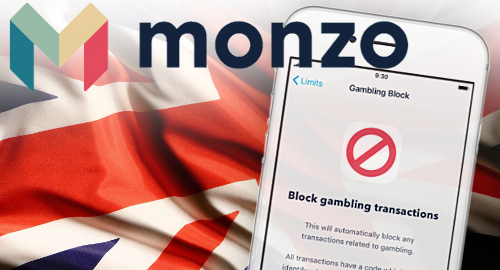 UK-based mobile-only bankers Monzo have pledged to introduce a new feature allowing customers to block all gambling transactions from their Monzo accounts.
UK-based mobile-only bankers Monzo have pledged to introduce a new feature allowing customers to block all gambling transactions from their Monzo accounts.
Currently, Monzo says its policies regarding suspected problem gambling activity includes identifying patterns of behavior, then starting a “sensitive, tactful conversation” with the customer and potentially pointing them in the direction of the GamCare charity, which provides free software to block customers’ access to gambling sites.
This week, Monzo announced that it was adding functionality to its mobile app ‘in the next few weeks” that will allow users to self-exclude directly from their bank account. The feature will be included in the app’s settings, which, if switched on, will prevent the use of customers’ Monzo accounts from being used for gambling purposes, be it online or land-based.
Monzo said its new feature will rely on identifying merchant category codes, and the company will “do our best to block any payments you try to make” to merchants whose codes indicate a gambling connection.
Should a customer decide to disable the feature, Monzo will require them to “chat with customer support first.” Should the customer still wish to disable the feature following this chat, Monzo will impose a 48-hour time-out before the customer can make the switch on their mobile device.
Monzo calls these steps “positive friction” intended to ensure customers don’t “impulsively” disable the self-exclusion, but do so only after they’ve had the chance to “understand the implications and make a considered decision.”
Monzo recognizes that the feature “isn’t a perfect or catch-all solution” but the company pledged to tinker with the tech following its release in the hope of helping customers avoid financial problems related to gambling, rather than closing the barn door after the cows have bolted.
Monzo is also considering allowing customers to set a “30-day rolling gambling limit” that would prevent gamblers from exceeding their spending, requiring a “trusted friend” to authorize gambling transactions, lowering limits on cash withdrawals and other payments, and setting aside money for bills in a ‘protected’ zone that ensures customers can’t blow the rent or car payment on gambling.
Last year, the GambleAware charity issued a report that claimed the industry’s retail self-exclusion scheme was performing well, but investigative media poked a few holes in that claim. In March, Paddy Power Betfair rolled out a new electronic self-exclusion system, replacing its retail paper-based system.
Online gambling accounted for 96% of self-exclusions in a recent UK market study and the UK Gambling Commission has been spanking numerous UK operators for failures in their individual self-exclusion programs.